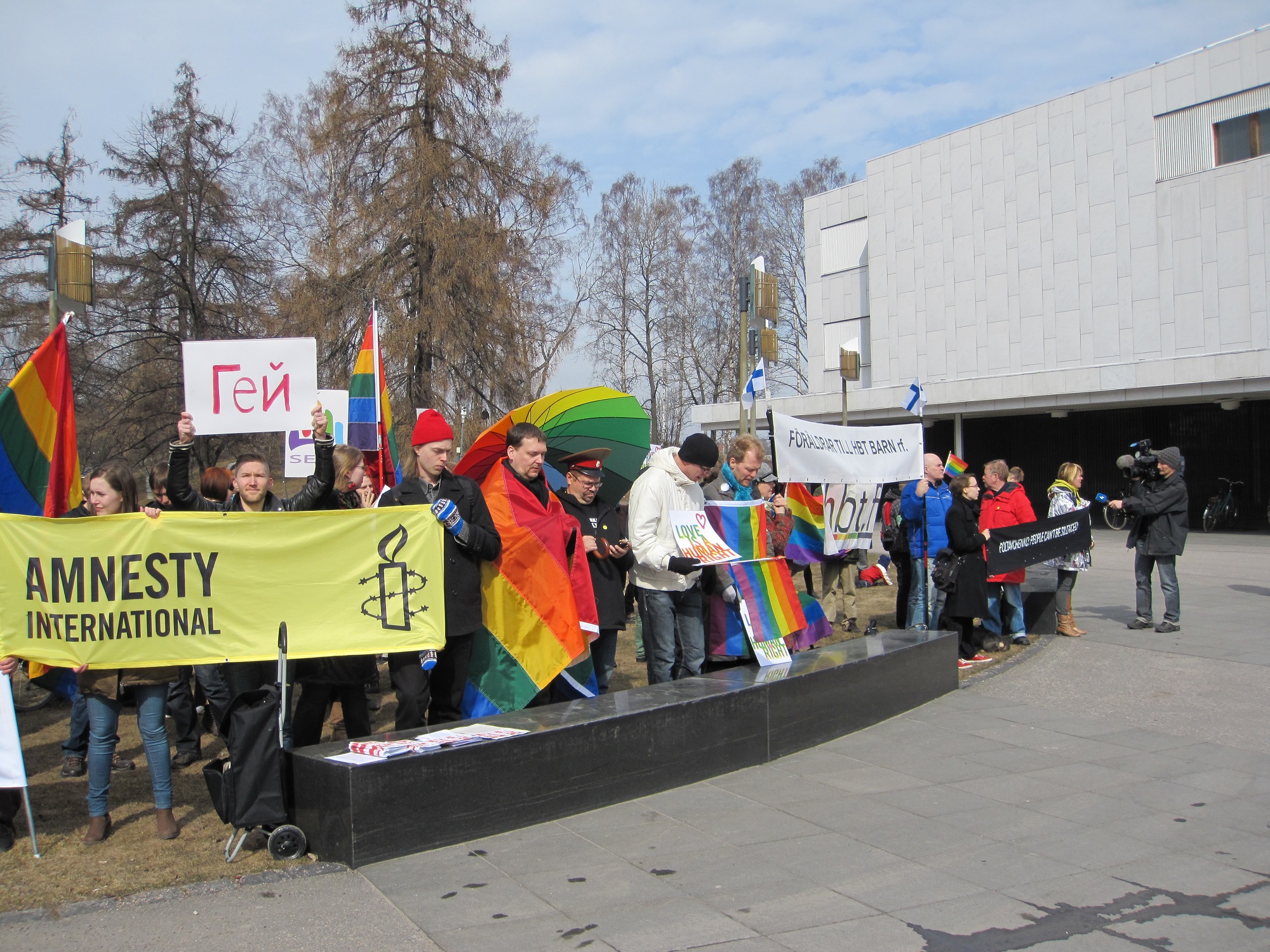
Text: Pauliina Lukinmaa, John Kaye
Article in Finnish here
Russia’s expanded ‘propaganda law’ is challenging the LGBTQI+ community and erasing already marginalized sexual and gender identities from the public sphere. Ten years after the country accepted its first propaganda law, LGBTQI+ activism in Russia is effectively being banned outright.
For Russia, the period from the 2000s onward has seen the role of the state and its overseeing eye increase significantly in importance. Russia’s first propaganda law (article 6.21.), accepted in 2013, cemented ‘gay propaganda’ as part of the Russian political lexicon and garnered global attention upon its entry into force. The law saw the Russian state define homosexuality as non-traditional sexual relations, further stigmatizing gender and sexual minorities in the country.
According to authorities, the law is intended to protect minors from influences deemed harmful, including marginalized ‘non-traditional’ sexualities and gender identities. The law is part of Russia’s neoconservative family and sexuality policy, in which the family unit is made up of a mother, a father, who is also a ‘defender of the nation’, and children. The Russian state encourages families to have more than two children, both in rhetoric and using financial incentives.
The so-called ‘gay propaganda law’ touches on more than marginalized sexualities and gender identities. It also equates LGBTQI+ minorities with paedophilia. The law bans the discussion of LGBTQI+-related themes everywhere – not just in the public sphere – with the looming threat of considerable fines. The law categorizes ‘propaganda’ of non-traditional relations as an administrative offense, meaning convictions on the basis of this law alone are punishable by fines and not prison time, for now.
Research has shown that in the period following the passage of the 2013 law, instances of homo- and transphobic violent crime in Russia rose significantly. The new legislation introducing an outright ban on discussion and portrayal of LGBTQI+ identities entered into force in November, 2022. In practice, these changes are set to do away with LGBTQI+ content across all sectors of society.
The reformed law also includes a new addition – the concept of ‘encouraging one to change one’s gender’ as a punishable form of so-called ‘propaganda’. Trans identities in Russia have come more visibly to the fore in public discourse in recent years, from Putin’s offensive references to trans people to the discussion of the 2014 traffic safety law reform that threatened to take away the right of trans individuals to operate vehicles, citing trans identities as an illness.
This proposal was ultimately dropped from the reform project, but the case was a clear indication of the Russian state’s increasing hostility toward the trans community. This a significant change, as trans issues have until recently been discussed in a manner that, while pathologizing trans identities, was separate from the public discussion of ‘propaganda’. There has been a clear amplification of conservative narratives elsewhere, too – including in Finland – notably claims that children and youth are being “conditioned to gender dysphoria” in schools.
From an atmosphere of fear to self-censorship
In Russia, the word ‘propaganda’ can be used to refer to nearly any information about sexual and gender minorities that can be understood to normalize or otherwise provide positive portrayals of the LGBTQI+ community. Going forward, Russia’s federal agency responsible for the monitoring of mass media, Roskomnadzor, will hold the pen on the definition of ‘propaganda’. The agency produced a list of criteria to this end in January, 2023.
The instructions leave something to be desired; in their current form, they fail to provide exceptions for doctors, psychiatrists and psychologists to deal with LGBTQI+ themes with patients in their clinical work. According to Coming Out, some psychologists have already begun actively excluding LGBTQI+ themes in their own practice. In addition, the criteria do not account for freedom of academic expression.
The law’s ambiguities are typical of Russia’s authoritarian state leadership. The legal text leaves considerable room for arbitrary interpretation on the part of the authorities – a phenomenon that has proven an effective tool in regulating citizens’ behaviour.
Publishing house Popcorn Books, known for its LGBTQI+ collections, was the first company to be charged with spreading ‘propaganda’ under the new law. The case has served as a frightening reminder of what is possible. Insecurities around what is illegal and how actively adherence to the law would be monitored have created a situation in which companies, NGOs and individual citizens have come to rely on self-censorship to avoid prosecution and devastating fines. For example, numerous large bookstore chains and streaming services have deleted LGBTQI+ content from their libraries as a precautionary measure – even deleting individual scenes from well-known series.
Roskomnadzor has taken to investigating LGBTQI+ bloggers and, since the start of the war, intensified social media monitoring, including using artificial intelligence tools. For example, transgender sex workers using social media platforms online to advertise their services have been traced and subsequently charged.
According to LGBT movement “Coming Out”, the law has brought about serious consequences for especially vulnerable sexual and gender minorities. For example, transgender sex workers of Central Asian origin have been deported from Russia to countries where homosexuality is illegal.
Activists at risk in Russia
Russia’s political atmosphere has become increasingly severe over the course of 2010s. Just before the launch of its full-scale invasion of Ukraine in 2022, Russia increased new restrictions on the right to congregate and freedom of expression. At the same time, the state increased its military readiness. The ongoing war has seen public neoconservative rhetoric in Russia taken to the extreme, including increasingly patriarchal public discourse, censorship and police surveillance. Already vulnerable minorities and civil society actors have found themselves in an even more precarious position.
Many activists with networks abroad and other necessary resources have managed to move away from Russia. In spring 2022, two established LGBTQI+ organizations in Saint Petersburg officially moved their documentation, offices and staff to Estonia and Lithuania, all the while maintaining their activities in Russia, at least in part.
Today, activists in Saint Petersburg are attempting to enact change in their society through work underground, with meagre funding and resources. Currently there is one LGBTQI+ community centre operating in the city, Deistvija (eng. Action), relying on the work of local volunteers. In challenging conditions, the centre aims to offer accessible services, peer support and a safer space for local LGBTQI+ individuals and groups in its office. For their own safety, they are only able to share the address with trusted contacts.
In 2022, they offered their space to groups and organized hundreds of events that were, according to a volunteer representative, attended by over 3,000 community members. Organizations that have moved out of Russia have tried to remain in contact with their LGBTQI+ activists through online events, including workshops, film screenings and peer support groups.
Since the launch of its full-scale invasion of Ukraine, the Russian state has set about more actively restricting freedom of expression and the work of civil society organizations and activists. In the words of a Deistvija volunteer – in difficult times, we rely on the support of our own community.
